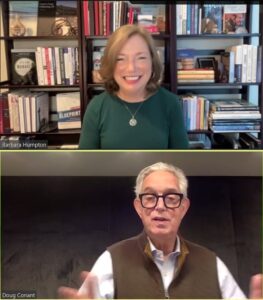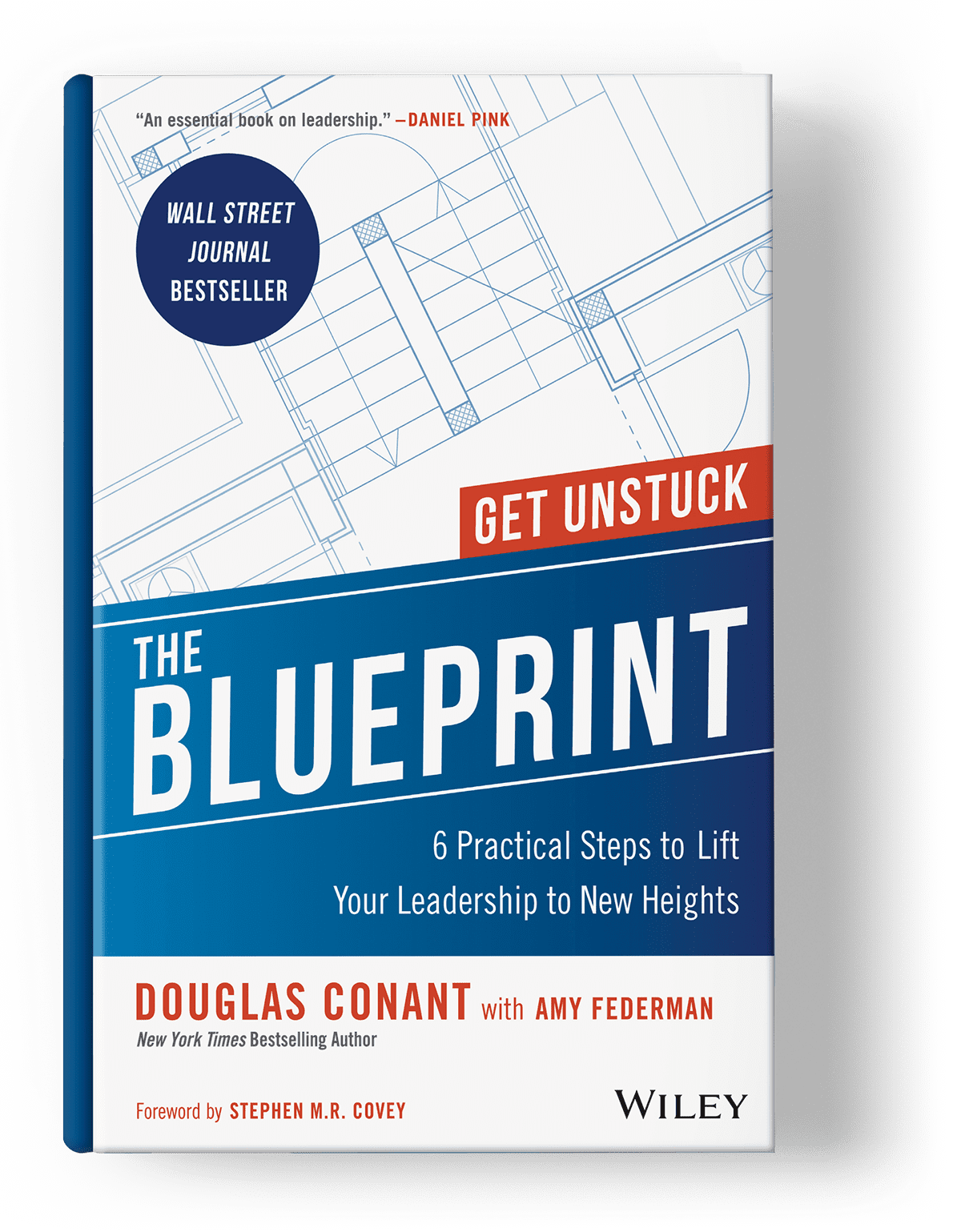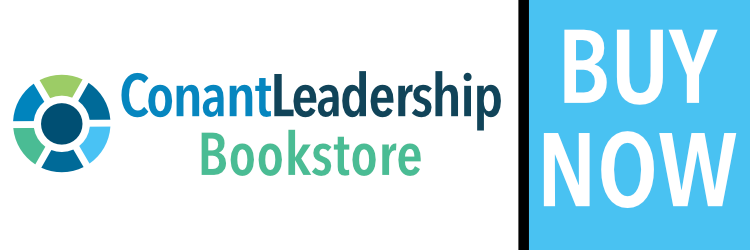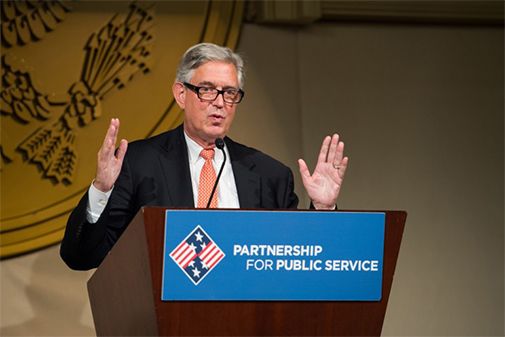This fall, at ConantLeadership’s 6th biannual BLUEPRINT Leadership Summit—a virtual meeting of top leadership luminaries—Barbara Humpton (CEO of Siemens USA and host of The Optimistic Outlook podcast) spoke with Doug Conant (Founder of ConantLeadership, former CEO of Campbell Soup Company, and bestselling author of The Blueprint and TouchPoints) about how optimism and courage in leadership are key to shaping the future.
Enjoy the following tips and takeaways from their conversation in this blog recap. And you can watch the full video conversation here (skip to roughly minute 5 to skip intros and housekeeping).
Great Leaders Break the Mold
As CEO of Siemens USA, Barbara Humpton says she is proud to be “transforming the everyday” at a company that is a technological pioneer in an array of industries—from healthcare, to mobility, to aerospace, and beyond. Her commitment to making an impact began with her upbringing in Lexington, VA where her father was a professor at the Virginia Military Institute. He instilled a hopeful spirit of self-belief that, “even as a kid from a small town of 3,000 people, what I did as an individual mattered.” Years later, that desire to make a difference informed Humpton’s decision to join Siemens: “I needed to be part of an organization that was working on world-changing technologies.”
Humpton often draws lessons from past experiences, including challenges she faced on her corporate journey. In the 1980s and 1990s, leaders were expected to fit the mold of an Industrial Age tycoon—to uphold the model of fixed, authoritarian leadership. As a woman and a parent in the business world, she often received messages that she didn’t comport with the old guard’s idea of a leader. Humpton remembers one male mentor telling her “you can’t be an executive and a mother,” despite the fact that she already had two children. Another leadership expert gave her feedback that she was “too nice” and “smiled too much.” It was clear that some people doubted her ability to move up the corporate ladder.
Doug Conant, who also faced setbacks on his rise to the C-suite, relates to the idea of not fitting the mold. As a lifelong introvert, he recalls how common it once was (and sometimes still is) for companies to deploy a rigid brand of leadership training that never matched up to his own individual values or temperament. He says that this dated approach was less about preparing people to be the best leaders they could be, and more about molding them into a cookie-cutter version of what the company wanted.
Both panelists agree that forced conformity is at odds with the self-knowledge that today’s leaders need to be truly effective. Conant says that leaders of all types can “show up in an authentic and genuine way,” and perform, as long as they’re rooted in the courage of their convictions. And Humpton knows that staying true to yourself is key: Even after being told she wasn’t destined for the C-suite, she still found the courage to persist in her career by getting “deeply engaged in the missions I was assigned to,” and staying focused on bringing life-improving technologies to the world.
It’s precisely that combination of optimism and courage that eventually helped both CEO panelists rise through the ranks—regardless of detractors and doubters—and it’s still what fortifies their leadership today.
During Humpton’s time in middle management, she says she quickly learned to call on her inner strength and “flex the courage muscle,” which often meant she had to “speak truth to power,” while also being diplomatic and sensitive towards everybody’s point of view. She learned to stand up for people and to ask questions that others were afraid to voice. “There are lots of ways to be courageous,” while still being respectful, she affirms: You can stay positive and “stick to principles . . .without having to humiliate people.”
Leadership Is a Practice, Not a Position
Building on the theme of respect, Humpton recommends Robert Fulghum’s book, All I Really Need to Know I Learned in Kindergarten, an ode to basic yet profound concepts—kindness, generosity, teamwork, and more—that most of us learned in childhood. She says leaders should refer back to these core tenets because “solid foundations are mightily important.”
Conant agrees. He knows that timeless truths, like the golden rule, hold power: “If you earnestly work to take care of the agenda of the people with whom you work, they will earnestly work to care of your agenda and the mission of the company.” This works, not because of an underhanded expectation of reciprocity, but because of the fundamental power of “being tough-minded on standards and tenderhearted with people.” Care for others, and they’ll care for you.
Both panelists reinforce that leadership is all about the people. Being a leader isn’t so much a position as it is a practice of consistency and care that drives collective success. And the fundamentals stay the same even as a company grows.
Humpton says: “The way you lead 45,000 people is that you lead the first line around you, just the same way you did as a first-line manager, and you let them take care of the people around them.” Part of honoring others is to encourage them to “use their own style and their own skills” to get the job done, as long as they are staying “aligned and anchored” to a shared purpose. She says effective leaders extend trust; they must learn the art of “capitalizing on [their] greatest strengths and allowing other people to capitalize on theirs.”
Rise to the Challenge of a New Paradigm
The two CEOs acknowledge that leadership is more challenging than ever. Today, the world is in a constant state of change. While volatility is unavoidable, Conant says leaders can create stability by remaining “tethered to the mission.” He says, with a strong foundation as the backbone of the enterprise, leaders can handle the “granular mess” of any given moment, as long as people are given enough room and support to perform.
Conant asks Humpton how she stays connected to Siemen’s mission while also uplifting leaders and holding them accountable. She shares that Siemens decided to “eliminate performance management theater.” Instead, “growth talks and constant communication between leader and employee” take precedence. Now, the focus is on the four priorities of their mission, “customer impact, technology with purpose, empowerment, and growth mindset.” Arbitrary checklists have gone out the window and the spotlight is on outcomes.
As for those rigid models of leadership the panelists mentioned earlier in the session—the ones that didn’t leave room for smiling or parenthood? “We burned that down,” Humpton says pointedly. And the difference was palpable.
During the transition, she and her colleagues were privately mulling over how to handle one under-performing manager who had been errantly promoted “year after year by an old system.” Before they ever reached a decision, the manager resigned on his own accord. He knew he didn’t fit into the company’s new culture. It was a meaningful shift for Humpton: “I feel like we’ve been successful when we are so clear in our work direction and where we’re headed, that people can self-select whether they belong or not.”
Similarly, Conant recalls the paradigm shift at Campbell Soup Company when he took over as CEO and began to implement a “people first” approach to lifting performance. The old, pre-existing Campbell culture had valued shareholders and financial performance at any cost, and the company was suffering. The new culture he was building would honor people above all else because Conant believed that, “to win in the marketplace, you must first win in the workplace. “ He was right: The strategic focus on employee engagement created a culture that skyrocketed from the worst engaged in the Fortune 500 to the best in the Fortune 500 over a decade—and as engagement improved, so did financial performance.
But in the early days of Conant’s CEO tenure, not everyone was convinced of his vision. He says Campbell “turned over 300 of our top 350 leaders” within the first three years. While many were let go, many others made their own proactive choice to leave: “Ultimately, many of those people just chose to leave and go find places where there was a better fit for them.” This kind of clarity is a gift—both for the leader and for the employees who move on. “Invite everybody along for the ride as long as they’re rising to the challenge of that new paradigm,” he says. And those who don’t feel aligned with the new culture will find a happier home elsewhere.
Courage and the ‘Voyage of Joy’
For leaders who do want to rise to the challenge of a new paradigm, the panelists reiterate that optimism and courage are key. Humpton notes that Siemens is in the midst of “defining a new tech sector” which requires boldness and “enough strategic patience to allow people to get there.” Conant adds that leaders need to “be curious and lead by listening,” especially when communicating with stakeholders who are struggling to understand a new direction or innovation. If you are positive and conscientious, the message will spread and acceptance will grow.
Humpton agrees that evolution, especially in infrastructure and technology, requires a level of nuance and an “overlap of ideas and disciplines.” Her podcast, The Optimistic Outlook, is one way she has created space for these nuanced conversations. She brings clarity to complex topics and interviews a range of experts to learn how reinventing infrastructure can help address societal challenges. A positive outlook is central because Humpton firmly believes that optimism is a competitive advantage for leaders: It’s “a component that allows us to see the world as it is and then have the deep-seated conviction that we have what it takes to do what needs to be done.” Leaders must believe in what’s possible, then use that belief to execute their vision.
Humpton says Conant’s book, The Blueprint, which asks readers to envision their boldest dream of leadership success, can help leaders feel empowered to accomplish big things. “When you allow yourself to want something, suddenly you see the opportunities; the stairsteps along the way appear. And, boy, it’s a voyage of joy at that point” to bring your goals to fruition.
To illustrate the “voyage of joy,” Humpton tells a heartwarming story: Last year, in the midst of a dangerous heatwave in Florida, a senior citizen with a medical condition desperately needed a Siemens part for a switch panel in her home. Her electrician couldn’t find the part on short notice. The woman reached out to Siemens directly, saying “I don’t know who else to turn to.” Humpton jumped into action and sent the note to every leader responsible for that business. 24 hours later, there was a part waiting for the customer. It was a happy outcome that reinforced the can-do spirit of a positive outlook: “An organization that can take care of the biggest mega orders and make sure that little old lady in Florida gets her panel, that’s the kind of performance that makes me so proud.”
Humpton says it’s that level of impact—the “doing what needs to be done” part of optimism—that can propel an entire organization and its people forward. For leaders willing to embark on this voyage of joy, she offers one simple reminder: “You have everything you need, right inside you, in order to do great things.”
___________________________
Enjoyed these insights?
Watch the all the recordings from the 6th biannual BLUEPRINT Leadership Summit in our video library here. And you can also access our complete inventory of previous summit sessions here, including conversations with Brené Brown, Susan Cain, Indra Nooyi, Amy Edmondson, Bill George, and many more. Then, pre-register for our spring 2024 Blueprint Leadership Summit here.
 About the Author: Vanessa Bradford is a freelance content writer and copywriter, and C3PR’s Content Marketing Director.
About the Author: Vanessa Bradford is a freelance content writer and copywriter, and C3PR’s Content Marketing Director.
(Cover photo by Greyson Joralemon on Unsplash)







0 Comments